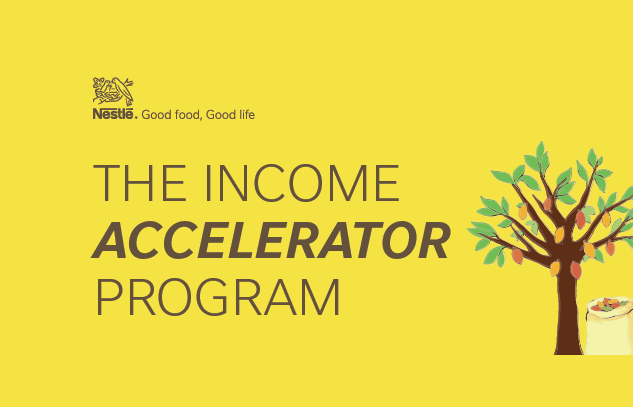We are helping to close the living income gap for cocoa-farming communities

An innovative income accelerator program aimed at addressing child labor risks
Cocoa-farmers in our supply chains face systemic challenges, from rural poverty and climate risk to a lack of access to financial services and basic infrastructure, such as water, health care and education.
These factors can lead to social issues, including the prevalence of child labor in cocoa production. By helping families close the gap to living income and protect children, the program aims to tackle child labor risks.
Nestlé’s efforts over many years have helped, but more is needed. We are launching a holistic approach to getting kids in school, accelerating farmer income and supporting families.
Helping farmers achieve a living income
Our income accelerator program aims to improve the livelihoods of cocoa-farming families. The program rewards cocoa-farming families not just for the quantity and quality of their beans, but also for practices that benefit the environment and community.
Our holistic approach aims to deliver long-lasting impact by incentivizing the enrolment of children in school, while advancing regenerative agriculture practices and gender equality.
Examples of practices that we will incentivize, through cash payments, include:
- School enrollment for all children in the household ages 6-16
- Implementing good agricultural practices, such as pruning, which increase crop productivity
- Performing agroforestry activities to increase climate resilience, like planting shade trees
- Generating diversified incomes, for example through growing other crops; raising livestock such as chickens, beekeeping, or processing other products like cassava
Building on the learnings of the Nestlé Cocoa Plan
The program builds on the work we have been doing for more than a decade to improve the livelihoods of smallholder farmers in our cocoa supply chains, through the Nestlé Cocoa Plan. What we have learned from this program informs our current approach, focusing on initiatives proven to positively impact farming families and reduce child labor risk.
As we scale up, we will more than triple our annual investment in cocoa sustainability, investing more than CHF 1 billion over the next decade and building on the progress made to date through the Nestlé Cocoa Plan.
Expanding the income accelerator program to 160 000 cocoa-farming families
What started as a pilot with 1,000 Nestlé Cocoa Plan farmers in 2020 in Côte d’Ivoire, our program will scale and expand over the next decade, informed by continuous evaluation and learning. By 2030, our ambition is to reach all cocoa-farming families in our global supply chain.
2020
Pilot program
Côte d’Ivoire2022
Test at scale
10 000 cocoa-farming families, Côte d’Ivoire2024
Scale-up
Program extension in Ghana + Global supply chain rollout2030
Reach
160 000 cocoa-farming families globallyDirect cash incentives to grow income substantially
During the first two years, cocoa-farming families can earn up to CHF 500 in direct bonus payments annually by taking part in the program and reaching the associated targets. As farmers’ incomes increase from additional sources and better yields, the cash incentive is reduced to CHF 250.
The income accelerator program pays cash incentives directly to farmers, via secure mobile transfer. The cash incentive is split equally between the male and female head of household to encourage gender equality, share financial responsibilities, and build more resilient households.
Collaboration is crucial
Our ambitious program would not be possible without the support and input of our longstanding partners. Alongside IDH (The Sustainable Trade Initiative), ICI (International Cocoa Initiative), the Rainforest Alliance, governments and farmers, we will continuously measure, assess and strengthen the program to deliver maximum impact for farming families.
Increased traceability and transparency
At the same time, we are remodeling our sourcing to segregate and trace all cocoa products from origin to factory, which in turn makes it easier to achieve greater transparency in our supply chain.We aim to bring about lasting change and transform how we source our cocoa, enabling us to achieve full traceability and segregation of our cocoa products, from origins to factory, in the next five years.
This will drive greater supply chain transparency and accountability, both internally and on an industry-wide scale, while giving our consumers more visibility into the source of their ingredients. This is critical to effectively addressing child labor risks in cocoa production.






